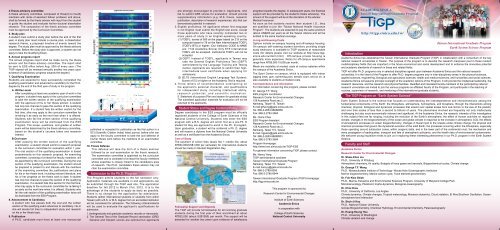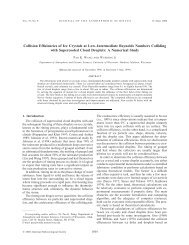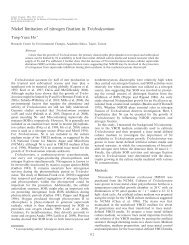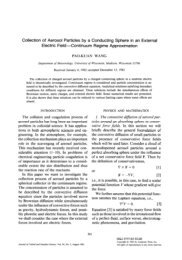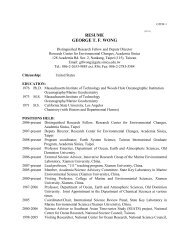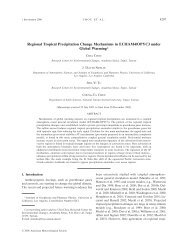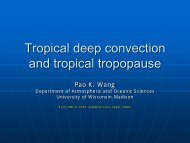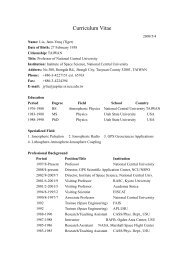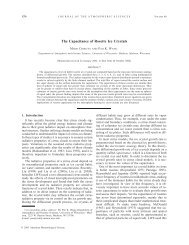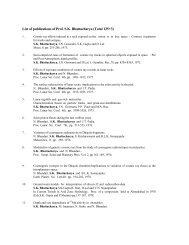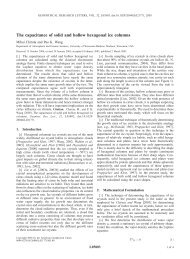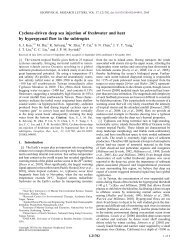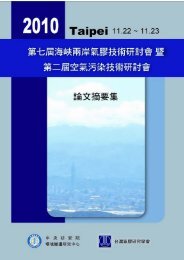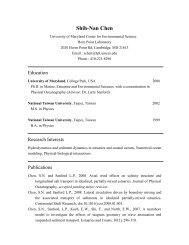http://tigp.sinica.edu.tw/ Introduction The TIGP Program on âEarth ...
http://tigp.sinica.edu.tw/ Introduction The TIGP Program on âEarth ...
http://tigp.sinica.edu.tw/ Introduction The TIGP Program on âEarth ...
Create successful ePaper yourself
Turn your PDF publications into a flip-book with our unique Google optimized e-Paper software.
4.<str<strong>on</strong>g>The</str<strong>on</strong>g>sis advisory committee<br />
A thesis advisory committee, composed of three(3) to five(5)<br />
members with ranks of assistant fellow/ professor and above,<br />
shall be formed by the thesis advisor with input from the student<br />
to guide the student and evaluate his/her doctoral dissertati<strong>on</strong><br />
research. <str<strong>on</strong>g>The</str<strong>on</strong>g> compositi<strong>on</strong> of the thesis advisory committee<br />
must be approved by the Curriculum Committee.<br />
5. Study plan<br />
A student must submit a study plan before the end of the first<br />
year. A study plan must include a course plan, a dissertati<strong>on</strong><br />
research theme, a proposed timeline of events toward the<br />
degree. <str<strong>on</strong>g>The</str<strong>on</strong>g> study plan must be approved by the thesis advisory<br />
committee. Before the study plan is approved, a student can not<br />
apply to take the Qualifying Exam.<br />
6. Annual progress report<br />
<str<strong>on</strong>g>The</str<strong>on</strong>g> annual progress report shall be made out by the thesis<br />
advisor and the thesis advisory committee. <str<strong>on</strong>g>The</str<strong>on</strong>g> report shall<br />
be sent to ESS office before Aug. 20th of every year. (<str<strong>on</strong>g>The</str<strong>on</strong>g><br />
<str<strong>on</strong>g>TIGP</str<strong>on</strong>g> stipend will be renewed annually another <str<strong>on</strong>g>tw</str<strong>on</strong>g>o years up<strong>on</strong><br />
evidence of satisfactory progress towards the degree.)<br />
7. Qualifying Examinati<strong>on</strong><br />
Students are expected to have successfully completed the<br />
qualifying examinati<strong>on</strong> and advanced to candidacy for the Ph.D.<br />
degree by the end of the third year of study in the program.<br />
A. Written exam<br />
After completing at least <strong>on</strong>e academic year of work in the<br />
program, a student may apply to the curriculum committee<br />
to take the written secti<strong>on</strong> of the qualifying examinati<strong>on</strong><br />
with the approval of his or her thesis advisor. A student<br />
has <strong>on</strong>ly <str<strong>on</strong>g>tw</str<strong>on</strong>g>o chances to pass this secti<strong>on</strong> of the qualifying<br />
examinati<strong>on</strong>. If a student fails the written secti<strong>on</strong> for the<br />
first time, s/he may apply to the curriculum committee for<br />
re-taking it as early as the next time when it is offered.<br />
Students who fail the written secti<strong>on</strong> of the qualifying<br />
examinati<strong>on</strong> <str<strong>on</strong>g>tw</str<strong>on</strong>g>ice will be dismissed from the ESS<br />
<str<strong>on</strong>g>Program</str<strong>on</strong>g>. <str<strong>on</strong>g>The</str<strong>on</strong>g> scope, questi<strong>on</strong>s, and grades of written<br />
exam will be determined by the thesis advisory committee,<br />
based <strong>on</strong> the student’s courses taken and research<br />
interest.<br />
B.Oral exam<br />
After passing the written secti<strong>on</strong> of the qualifying<br />
examinati<strong>on</strong>, a student should submit a research proposal<br />
to the curriculum committee for evaluati<strong>on</strong> within 1 year.<br />
<str<strong>on</strong>g>The</str<strong>on</strong>g> oral secti<strong>on</strong> of the qualifying examinati<strong>on</strong> is based<br />
predominantly <strong>on</strong> this research proposal. An examining<br />
committee, c<strong>on</strong>sisting of at least five faculty members, will<br />
be appointed by the curriculum committee. During the oral<br />
secti<strong>on</strong> of the qualifying examinati<strong>on</strong>, the student should<br />
be prepared to present to and discuss with the members<br />
of the examining committee the justificati<strong>on</strong>s and plans<br />
for his or her thesis work, including relevant literature, and<br />
his or her progress <strong>on</strong> the thesis work to date. A student<br />
has <strong>on</strong>ly <str<strong>on</strong>g>tw</str<strong>on</strong>g>o chances to pass this secti<strong>on</strong> of the qualifying<br />
examinati<strong>on</strong>. If a student fails this secti<strong>on</strong> for the first time,<br />
s/he may apply to the curriculum committee for re-taking it<br />
as early as the next time when it is offered. Students who<br />
fail the oral secti<strong>on</strong> of the qualifying examinati<strong>on</strong> <str<strong>on</strong>g>tw</str<strong>on</strong>g>ice will<br />
be dismissed from the ESS <str<strong>on</strong>g>Program</str<strong>on</strong>g>.<br />
8. Advancement to Candidacy<br />
A student who has passes both the oral and the written<br />
secti<strong>on</strong> of the qualifying exam advances to candidacy. He or<br />
she will devote full time to independent study and research<br />
<strong>on</strong> his or her thesis topic.<br />
9. Publicati<strong>on</strong><br />
A Ph.D. candidate must have at least <strong>on</strong>e manuscript<br />
Clim. ascent<br />
Clim. descent<br />
radiative<br />
cooling<br />
Ⅱb Ⅱa Ⅰ Ⅲ Ⅳa<br />
Low-level moistening<br />
but local deepening Low-level moistening,<br />
of c<strong>on</strong>vecti<strong>on</strong> r<str<strong>on</strong>g>edu</str<strong>on</strong>g>ced moist stability<br />
(rich-get-richer)<br />
drying by<br />
- V ⋅∇q<br />
'<br />
(upped-ante)<br />
or<br />
warming by<br />
surface flux<br />
(ocean dynamics)<br />
- V ⋅ ∇T '<br />
Ⅳb<br />
reversed<br />
rich-get-richer;<br />
cooling by<br />
- V ⋅∇T '<br />
published or accepted for publicati<strong>on</strong> as the first author in a<br />
SCI (Scientific Citati<strong>on</strong> Index) listed journal, before s/he can<br />
apply to the faculty committee to take the oral defense of<br />
his/her thesis work before the members of an examinati<strong>on</strong><br />
committee.<br />
10. <str<strong>on</strong>g>The</str<strong>on</strong>g>sis Defense<br />
This defense will take the form of a thesis seminar<br />
followed by an oral examinati<strong>on</strong> <strong>on</strong> the thesis research.<br />
<str<strong>on</strong>g>The</str<strong>on</strong>g> examinati<strong>on</strong> committee is appointed by the curriculum<br />
committee and is c<strong>on</strong>sisted of at least five faculty members<br />
whose expertise is closely linked to the candidate’s area<br />
of research. <str<strong>on</strong>g>The</str<strong>on</strong>g> Ph.D. candidate’s thesis advisor may not<br />
chair the examinati<strong>on</strong> committee.<br />
Admissi<strong>on</strong> to the Ph.D. <str<strong>on</strong>g>Program</str<strong>on</strong>g><br />
<str<strong>on</strong>g>The</str<strong>on</strong>g> <str<strong>on</strong>g>Program</str<strong>on</strong>g> admits students to the fall semester <strong>on</strong>ly.<br />
Applicati<strong>on</strong> materials are available in and applicati<strong>on</strong>s can<br />
be submitted through the <str<strong>on</strong>g>TIGP</str<strong>on</strong>g> web site. <str<strong>on</strong>g>The</str<strong>on</strong>g> applicati<strong>on</strong><br />
deadline for fall 2012 is March 31st, 2012. It is to the<br />
advantage of the students to apply as early as possible.<br />
<str<strong>on</strong>g>The</str<strong>on</strong>g>re is no charge for the applicati<strong>on</strong> for admissi<strong>on</strong>s.<br />
Students (either internati<strong>on</strong>al students or students from within<br />
Taiwan) with a B.S. or M.S. degree from an accredited instituti<strong>on</strong><br />
will be c<strong>on</strong>sidered for admissi<strong>on</strong>. <str<strong>on</strong>g>The</str<strong>on</strong>g> following criteria/material<br />
will be used to evaluate the applicant’s qualificati<strong>on</strong>s for<br />
admissi<strong>on</strong>:<br />
1.Undergraduate and graduate academic records or transcripts.<br />
2. <str<strong>on</strong>g>The</str<strong>on</strong>g> General Test of the Graduate Record xaminati<strong>on</strong> (GRE)<br />
General and Subject scores are opti<strong>on</strong>al but applicants<br />
are str<strong>on</strong>gly encouraged to provide it. Applicants, who<br />
fail to submit GRE scores for evaluati<strong>on</strong>, should provide<br />
supplementary informati<strong>on</strong> (e.g. M.S. thesis, research<br />
publicati<strong>on</strong>, descripti<strong>on</strong> of research experiences, etc) that can<br />
dem<strong>on</strong>strate potential in research.<br />
3. English proficiency: All applicants whose first language<br />
is not English must submit the English test score, except<br />
those applicants who have recently completed <str<strong>on</strong>g>tw</str<strong>on</strong>g>o or<br />
more years of study in an English-speaking country.<br />
(1) TOEFL: scores of 550 <strong>on</strong> the paper based (or 213 <strong>on</strong> the<br />
computer based or 79 <strong>on</strong> the New Internet-based TOEFL<br />
(TOEFL-iBT)) or higher; (Our instituti<strong>on</strong> CODE & NAME<br />
are: 7142 Academia Sinica) Only ETS Internati<strong>on</strong>al<br />
TOEFL will be accepted. Instituti<strong>on</strong>al TOEFL will not be<br />
accepted.<br />
(2) GEPT: Instead of TOEFL, applicants in Taiwan may<br />
take the General English Proficiency Test (GEPT)<br />
administered by the Language Training and Testing<br />
Center. Applicants are required to submit their highintermediate<br />
level certificate when applying for<br />
admissi<strong>on</strong>s;<br />
(3) IELTS (Internati<strong>on</strong>al English Language Test System):<br />
Scores of 5.5 or higher <strong>on</strong> the Academic Test is required.<br />
4. Three letters of recommendati<strong>on</strong> commenting <strong>on</strong><br />
the applicant’s pers<strong>on</strong>al character, and qualificati<strong>on</strong>s<br />
for independent study, including intellectual ability,<br />
research potential, and scientific motivati<strong>on</strong>.<br />
5. Statement of purpose (Plan and reas<strong>on</strong> for graduate study)<br />
<str<strong>on</strong>g>The</str<strong>on</strong>g> submitted applicati<strong>on</strong> materials for evaluati<strong>on</strong> will not be<br />
returned to the applicants.<br />
Student Status and Degree C<strong>on</strong>ferral Policy<br />
Degree candidates in the ESS program must be officially<br />
registered students of the College of Earth Sciences of the<br />
Nati<strong>on</strong>al Central University. Students who enter the ESS<br />
program with a B.S. degree will enroll first as a pre-Ph. D<br />
student till they are approved to enroll in the Ph. D program.<br />
Up<strong>on</strong> graduati<strong>on</strong>, a student will be c<strong>on</strong>ferred a Ph. D. degree<br />
and will receive a diploma from the Nati<strong>on</strong>al Central University<br />
as well as a certificate from the Academia Sinica.<br />
Cost of Study<br />
<str<strong>on</strong>g>The</str<strong>on</strong>g> payment of tuiti<strong>on</strong> fees (basic fee + credits fee, about<br />
NT$54,000/US$1,800 per semester) for internati<strong>on</strong>al students<br />
should be made <strong>on</strong> Student Registrati<strong>on</strong> Day.<br />
Fellowship Support and Stipends<br />
<str<strong>on</strong>g>The</str<strong>on</strong>g> <str<strong>on</strong>g>TIGP</str<strong>on</strong>g> will provide full fellowship for all incoming graduate<br />
students during the first year of their enrollment at about<br />
NT$32,000 (about US$1050) per m<strong>on</strong>th. <str<strong>on</strong>g>The</str<strong>on</strong>g> support will be<br />
extended for another <str<strong>on</strong>g>tw</str<strong>on</strong>g>o years up<strong>on</strong> evidence of satisfactory<br />
progress towards the degree. In subsequent years, the financial<br />
support will be provided by the student’s thesis advisor(s). <str<strong>on</strong>g>The</str<strong>on</strong>g><br />
amount of the support will be at the discreti<strong>on</strong> of the advisor.<br />
Medical Insurance<br />
As so<strong>on</strong> as the students receive their student I.D., they<br />
are qualified to join the “Taiwan Nati<strong>on</strong>al Health Insurance<br />
<str<strong>on</strong>g>Program</str<strong>on</strong>g>”. <str<strong>on</strong>g>The</str<strong>on</strong>g> students are expected to pay the same premium<br />
(about US$200 per year) as all the Taiwan citizens and will be<br />
entitled to the same medical coverage.<br />
Living and Housing Costs<br />
Opti<strong>on</strong>s include <strong>on</strong>-campus housing and off-campus housing.<br />
On-campus self-catering student dormitory providing single<br />
study bedrooms is available to <str<strong>on</strong>g>TIGP</str<strong>on</strong>g> students at reas<strong>on</strong>able<br />
costs (for details please visit our website at <str<strong>on</strong>g>http</str<strong>on</strong>g>://www.<str<strong>on</strong>g>tigp</str<strong>on</strong>g>.<br />
<str<strong>on</strong>g>sinica</str<strong>on</strong>g>.<str<strong>on</strong>g>edu</str<strong>on</strong>g>.<str<strong>on</strong>g>tw</str<strong>on</strong>g>/dorm.html) . Off-campus private housing is<br />
generally more expensive. Rents for off-campus apartments<br />
range from NT$5,000-15,000 per m<strong>on</strong>th.<br />
Meals are available at modest costs at various eateries within<br />
the campus of the Academia Sinica.<br />
<str<strong>on</strong>g>The</str<strong>on</strong>g> Sport Center <strong>on</strong> campus, which is equipped with indoor<br />
jogging track, gym, swimming pool, aerobic court, and so <strong>on</strong>, is<br />
also available to students at modest costs.<br />
Corresp<strong>on</strong>dence and Informati<strong>on</strong><br />
For informati<strong>on</strong> c<strong>on</strong>cerning this program, please c<strong>on</strong>tact:<br />
Dr. George T.F. W<strong>on</strong>g<br />
ESS program coordinator<br />
Research Center for Envir<strong>on</strong>mental Changes<br />
128 Academia Road sec.2,<br />
Nankang, Taipei115, Taiwan<br />
E-mail:gtfw<strong>on</strong>g@gate.<str<strong>on</strong>g>sinica</str<strong>on</strong>g>.<str<strong>on</strong>g>edu</str<strong>on</strong>g>.<str<strong>on</strong>g>tw</str<strong>on</strong>g><br />
Tel: 886-2-2653-9885#856<br />
Fax: 886-2-2783-3584<br />
Ms. Claire Chen<br />
ESS <str<strong>on</strong>g>Program</str<strong>on</strong>g> Assistant<br />
Research Center for Envir<strong>on</strong>mental Changes<br />
128 Academia Road sec.2,<br />
Nankang, Taipei 115, Taiwan<br />
E-mail: <str<strong>on</strong>g>tigp</str<strong>on</strong>g>ess@gate.<str<strong>on</strong>g>sinica</str<strong>on</strong>g>.<str<strong>on</strong>g>edu</str<strong>on</strong>g>.<str<strong>on</strong>g>tw</str<strong>on</strong>g><br />
Tel: 886-2-2653-9885#851<br />
Fax: 886-2-2783-3584<br />
<str<strong>on</strong>g>Program</str<strong>on</strong>g> Homepage:<br />
<str<strong>on</strong>g>http</str<strong>on</strong>g>://www.rcec.<str<strong>on</strong>g>sinica</str<strong>on</strong>g>.<str<strong>on</strong>g>edu</str<strong>on</strong>g>.<str<strong>on</strong>g>tw</str<strong>on</strong>g>/<str<strong>on</strong>g>TIGP</str<strong>on</strong>g>-ESS<br />
For general informati<strong>on</strong> c<strong>on</strong>cerning <str<strong>on</strong>g>TIGP</str<strong>on</strong>g>, please c<strong>on</strong>tact:<br />
Ms. Nancy Yang<br />
<str<strong>on</strong>g>TIGP</str<strong>on</strong>g> administrative assistant<br />
Taiwan Internati<strong>on</strong>al Graduate <str<strong>on</strong>g>Program</str<strong>on</strong>g><br />
Nankang, Taipei 115, Taiwan<br />
E-mail:nancyy@gate.<str<strong>on</strong>g>sinica</str<strong>on</strong>g>.<str<strong>on</strong>g>edu</str<strong>on</strong>g>.<str<strong>on</strong>g>tw</str<strong>on</strong>g><br />
Tel: 886-2-2789-8050<br />
Fax: 886-2-2785-8944<br />
Taiwan Internati<strong>on</strong>al Graduate <str<strong>on</strong>g>Program</str<strong>on</strong>g> (<str<strong>on</strong>g>TIGP</str<strong>on</strong>g>) Homepage:<br />
<str<strong>on</strong>g>http</str<strong>on</strong>g>://<str<strong>on</strong>g>tigp</str<strong>on</strong>g>.<str<strong>on</strong>g>sinica</str<strong>on</strong>g>.<str<strong>on</strong>g>edu</str<strong>on</strong>g>.<str<strong>on</strong>g>tw</str<strong>on</strong>g><br />
This program is sp<strong>on</strong>sored by<br />
Research Center for Envir<strong>on</strong>mental Changes<br />
and<br />
Institute of Earth Sciences<br />
Academia Sinica<br />
in cooperati<strong>on</strong> with<br />
College of Earth Sciences<br />
Nati<strong>on</strong>al Central University<br />
<str<strong>on</strong>g>Introducti<strong>on</strong></str<strong>on</strong>g><br />
ACADEMIA SINICA<br />
Taiwan Internati<strong>on</strong>al Graduate <str<strong>on</strong>g>Program</str<strong>on</strong>g><br />
<str<strong>on</strong>g>http</str<strong>on</strong>g>://<str<strong>on</strong>g>tigp</str<strong>on</strong>g>.<str<strong>on</strong>g>sinica</str<strong>on</strong>g>.<str<strong>on</strong>g>edu</str<strong>on</strong>g>.<str<strong>on</strong>g>tw</str<strong>on</strong>g>/<br />
Taiwan Internati<strong>on</strong>al Graduate <str<strong>on</strong>g>Program</str<strong>on</strong>g><br />
Earth System Science <str<strong>on</strong>g>Program</str<strong>on</strong>g><br />
Academia Sinica has established the Taiwan Internati<strong>on</strong>al Graduate <str<strong>on</strong>g>Program</str<strong>on</strong>g> (<str<strong>on</strong>g>TIGP</str<strong>on</strong>g>) in collaborati<strong>on</strong> with a c<strong>on</strong>sortium of the key<br />
nati<strong>on</strong>al research universities in Taiwan. <str<strong>on</strong>g>The</str<strong>on</strong>g> purpose of the program is to develop the research manpower pool in those modern<br />
multidisciplinary fields that are important in the future ec<strong>on</strong>omical and social development and to enhance the innovative potential<br />
and academic standards of research in these and related fields.<br />
<str<strong>on</strong>g>TIGP</str<strong>on</strong>g> will offer Ph.D. programs <strong>on</strong>ly in selected disciplines agreed up<strong>on</strong> be<str<strong>on</strong>g>tw</str<strong>on</strong>g>een Academia Sinica and the nati<strong>on</strong>al research<br />
universities. It is the intent of the <str<strong>on</strong>g>Program</str<strong>on</strong>g> to offer Ph.D. degree programs <strong>on</strong>ly in inter-disciplinary areas in the physical sciences,<br />
applied sciences, engineering, biological and agricultural sciences, health and medical sciences, and humanities and social sciences.<br />
Academia Sinica will assume principal oversight of the academic opti<strong>on</strong>s of the <str<strong>on</strong>g>Program</str<strong>on</strong>g>. It will provide the intellectual leadership, the<br />
research resources, and the research and physical facilities. Qualified and interested faculty members of the participating nati<strong>on</strong>al<br />
research universities are invited to join the various programs as affiliated faculty of the <str<strong>on</strong>g>Program</str<strong>on</strong>g>, and participate in the teaching of<br />
courses, supervisi<strong>on</strong> of research, and mentoring of the internati<strong>on</strong>al graduate students.<br />
<str<strong>on</strong>g>The</str<strong>on</strong>g> <str<strong>on</strong>g>TIGP</str<strong>on</strong>g> <str<strong>on</strong>g>Program</str<strong>on</strong>g> <strong>on</strong> “Earth System Science”<br />
Earth System Science is the science that focuses <strong>on</strong> understanding the interdependence and interc<strong>on</strong>necti<strong>on</strong>s am<strong>on</strong>g the<br />
fundamental comp<strong>on</strong>ents of the Earth: the lithosphere, atmosphere, hydrosphere, and biosphere, through the interacti<strong>on</strong>s am<strong>on</strong>g<br />
chemical, physical, biological and dynamical processes that extend over spatial scales from sub-micr<strong>on</strong> to the size of the planets,<br />
and over time scales of less than a sec<strong>on</strong>d to billi<strong>on</strong>s of years. <str<strong>on</strong>g>The</str<strong>on</strong>g> phenomena involved are frequently not <strong>on</strong>ly intellectually<br />
challenging but also socio-ec<strong>on</strong>omically relevant and significant. At the Academia Sinica, the research interests of the investigators<br />
in this subject field are far ranging, including the evoluti<strong>on</strong> of the Earth’s atmosphere, the effect of human activities <strong>on</strong> regi<strong>on</strong>al<br />
climate, changes in the biogeochemistry of the ocean and global climate in resp<strong>on</strong>se to the increase in atmospheric CO2, the effects<br />
of atmospheric processes <strong>on</strong> ocean biogeochemistry, changes in fluvial input to the oceans under climate change, the physical and<br />
chemical processes that govern the dynamical evoluti<strong>on</strong> of the solid Earth, the processes occurring within the lithosphere, especially<br />
those operating around subducti<strong>on</strong> z<strong>on</strong>es, within orogenic belts, and in the lower part of the c<strong>on</strong>tinental crust, the mechanism and<br />
wave propagati<strong>on</strong> of earthquakes, transport and fate of atmospheric pollutants, and the health risks of envir<strong>on</strong>mental c<strong>on</strong>taminants.<br />
We welcome young inquisitive minds to join us in exploring these interesting phenomena in our Ph.D. program in the Earth System<br />
Science.<br />
Faculty and Staff<br />
Academia Sinica<br />
Research Center for Envir<strong>on</strong>mental Changes<br />
Dr. Shaw-Chen Liu<br />
Ph.D., University of Pittsburg<br />
Atmospheric chemistry, Air quality, Budgets of trace gases and aerosols, Biogeochemical cycles, Climate change<br />
Dr. George T.F. W<strong>on</strong>g<br />
Ph.D., Massachusetts Institute of Technology- Woods Hole Oceanographic Instituti<strong>on</strong><br />
Marine biogeochemistry, Marine carb<strong>on</strong> cycle, Trace element geochemistry<br />
Dr. Fuh-Kwo Shiah<br />
Ph.D., Marine, Estuarine and Envir<strong>on</strong>mental Sciences <str<strong>on</strong>g>Program</str<strong>on</strong>g>- University of Maryland College Park.<br />
Microbial ecology, Plankt<strong>on</strong>ic tropho-dynamics, Biological oceanography<br />
Dr. Chia Chou<br />
Ph.D., University of California, Los Angles<br />
Climate dynamics, Climate changes, Tropical meteorology, M<strong>on</strong>so<strong>on</strong> dynamics, Cloud radiati<strong>on</strong>, El Nino/Southern Oscillati<strong>on</strong>, Oceanatmosphere-land<br />
interacti<strong>on</strong><br />
Dr. Shuh-Ji Kao<br />
Ph.D., Nati<strong>on</strong>al Taiwan University<br />
Isotope Biogeochemistry, Chemical Hydrology, Envir<strong>on</strong>mental Chemistry, Paleoceanography<br />
Dr. Huang-Hsung Hsu<br />
Ph.D., University of Washingt<strong>on</strong><br />
Climate variati<strong>on</strong> and change
Dr. Shih-Chun Candice Lung<br />
Sc.D. Harvard School of Public Health<br />
Exposure and risk assessment, Organic aerosols, Aerosol<br />
source apporti<strong>on</strong>ment<br />
Dr. Charles C.-K. Chou<br />
Ph.D., Nati<strong>on</strong>al Central University<br />
Physico-chemical characterizati<strong>on</strong> of atmospheric aerosols, Air<br />
quality m<strong>on</strong>itoring and management<br />
Dr. Danie Mao-Chang Liang<br />
Ph.D., California Institute of Technology<br />
Atmospheric photochemistry, Biogeochemical cycles of nitrogen<br />
and carb<strong>on</strong>, Astrobiology<br />
Dr. Chih-Chung Chang<br />
Ph.D., Nati<strong>on</strong>al Tsing Hua University<br />
Instrumental analysis, Analysis of volatile organic compounds,<br />
Amtospheric oz<strong>on</strong>e chemistry<br />
Dr. Shih-Chieh Hsu<br />
Ph.D., Nati<strong>on</strong>al Taiwan University<br />
Atmospheric Chemistry, Chemical Oceanography,<br />
Envir<strong>on</strong>mental Science, Biogeochemistry of Trace Elements<br />
Dr. Chuan-Yao Lin<br />
Ph.D., Nati<strong>on</strong>al Central University<br />
Air quality, Mesoscale Meteorology, Regi<strong>on</strong>al Climate Change,<br />
Urban heat island effect<br />
Dr. Tung-Yuan Ho<br />
Ph.D., State University of New York at St<strong>on</strong>y Brook<br />
Marine Biogeochemistry, Marine Organic Geochemistry,<br />
Envir<strong>on</strong>mental Chemistry, Envir<strong>on</strong>mental Analytical Chemistry<br />
Dr. Shih-Yu Lee<br />
Ph.D., University of Michigan<br />
Climate Dynamics, Paleoceanography, Geological Surface<br />
Process, Climate Interacti<strong>on</strong><br />
Institute of Earth Sciences<br />
Dr. Benjamin F<strong>on</strong>g Chao<br />
Ph.D., University of California, San Diego<br />
Earth/Planetary rotati<strong>on</strong> dynamics and gravitati<strong>on</strong>al variati<strong>on</strong>s.<br />
Global changes in geophysical fluids. Global geophysics and<br />
seismology. Digital data analysis and inverse/inference theories.<br />
Dr. Bor-Shouh Huang<br />
Ph.D., Nati<strong>on</strong>al Central University<br />
Seismology, Geophysics, Geosciences<br />
Dr. Ban-Yuan Kuo<br />
Ph.D., Brown University<br />
Seismology, Geodynamic Tect<strong>on</strong>ics<br />
Dr. Jian-Cheng Lee<br />
Ph.D., Université Pierre et Marie Curie<br />
Geodynamic, Computer Earth Science, Remote sensing,<br />
Morpho-structural Geology<br />
Dr. Cheng-Horng Lin<br />
Ph.D., Rensselaer Polytechnic Institute<br />
Seismology, Tect<strong>on</strong>ics<br />
Dr. Yu-Chang Chan<br />
Ph.D., University of C<strong>on</strong>necticut<br />
Neotect<strong>on</strong>ics, Structural Geology, Geomorphology<br />
Dr. Wu-Cheng Chi<br />
Ph.D., University of California at Berkeley<br />
Ocean-Bottom Seismology, Seismic Source, Tect<strong>on</strong>ophysics<br />
Dr. Li Zhao<br />
Ph.D., Princet<strong>on</strong> University<br />
Seismology<br />
Dr. Ya-Ju Hsu<br />
Ph.D., Nati<strong>on</strong>al Central University<br />
Crustal deformati<strong>on</strong><br />
Dr. Shiann-J<strong>on</strong>g Lee<br />
Ph.D., Nati<strong>on</strong>al Central University<br />
Seismology<br />
Dr. Chung-Ho Wang<br />
Ph.D., Univ. Hawaii<br />
Isotope Geochemistry, Isotope Hydrology<br />
Nati<strong>on</strong>al Central University<br />
College of Earth Sciences<br />
Department of Earth Sciences and Institute of Geophysics<br />
Dr. Chien-Ying Wang<br />
Ph.D., Saint Louis University<br />
Seismic methods, Seismology<br />
Dr. Kuo-F<strong>on</strong>g Ma<br />
Ph.D., California Inst of Tech<br />
Seismology, Tect<strong>on</strong>ics, Tsunami<br />
Dr. Kuo-Liang Wen<br />
Ph.D., Nati<strong>on</strong>al Central University<br />
Earthquake Engineering, Str<strong>on</strong>g Moti<strong>on</strong> Seismology, Site Effect<br />
Analysis<br />
Dr. Shu-Kun Hsu<br />
Ph.D., Université de Bretagne Occidentale<br />
Marine geophysics, Gravity and magnetics, Tect<strong>on</strong>ics<br />
Dr. Andrew Tien-Shun Lin<br />
Ph.D., Oxford University<br />
Geodynamics, Petroleum Geology, Sedimentary Geology<br />
Dr. Po-Fei Chen<br />
Ph.D., Northwestern University<br />
Seismology, Geophysics<br />
Dr. Chung-Pai Chang<br />
Ph.D., Université P. & M. Curie<br />
Structural Geology, Geodynamics, Geological Data Analysis<br />
Dr. K<strong>on</strong>stantinos I. K<strong>on</strong>stantinou<br />
Ph.D., University of Durham<br />
Volcanic Seismology, Tect<strong>on</strong>ophysics, Time series analysis<br />
Department of Atmospheric Sciences and Institute of<br />
Atmospheric Physics<br />
Dr. Tai-Chi Chen<br />
Ph.D., Saint Louis University<br />
Radar meteorology, Mesoscale meteorology<br />
Dr. Jough-Tai Wang<br />
Ph.D., Oreg<strong>on</strong> State University<br />
Climate dynamics , Numerical weather predicti<strong>on</strong><br />
Dr. Yu-Chieng Liou<br />
Ph.D., University of Oklahoma<br />
Radar meteorology , Four dimensi<strong>on</strong>al data assimilati<strong>on</strong><br />
Dr. Neng-Huei Lin<br />
Ph.D., North Carolina State University<br />
Atmospheric chemistry , Envir<strong>on</strong>mental polluti<strong>on</strong><br />
Dr. Kuo-Ying Wang<br />
Ph.D., Cambridge University<br />
Atmospheric chemistry , Envir<strong>on</strong>mental polluti<strong>on</strong><br />
Dr. Pay-Liam Lin<br />
Ph.D., Nati<strong>on</strong>al Central University<br />
Boundary layer meteorology, Mesoscale meteorology<br />
Graduate Institute of Hydrological and Oceanic Sciences<br />
Dr. K<strong>on</strong>-Kee Liu<br />
Ph.D., University of California, Los Angles<br />
Numerical modeling of aquatic biogeochemical systems, Marine<br />
carb<strong>on</strong> and nitrogen cycles, Isotope geochemistry<br />
Dr. Wu-ting Tsai<br />
Ph.D., Massachusetts Institute of Technology<br />
Air-sea interacti<strong>on</strong>, <str<strong>on</strong>g>The</str<strong>on</strong>g>oretical and numerical hydrodynamics<br />
Dr. Ming-Jen Yang<br />
Ph.D., University of Washingt<strong>on</strong><br />
Precipitati<strong>on</strong> physics and forecasting, Atmospheric modeling<br />
Graduate Institute of Space Science<br />
Dr. Lin-Ni Hau<br />
Ph.D., Rice University<br />
Space Plasma Physics, Magnetospheric Physics<br />
Dr. Jann-Yenq Liu<br />
Ph.D., Utah State University<br />
I<strong>on</strong>ospheric Physics, Space Physics<br />
Research Topics<br />
<str<strong>on</strong>g>The</str<strong>on</strong>g>re are three areas of c<strong>on</strong>centrati<strong>on</strong> in this graduate<br />
program.<br />
1. Aquatic Sciences<br />
<str<strong>on</strong>g>The</str<strong>on</strong>g> primary research emphasis in the aquatic sciences is <strong>on</strong><br />
the global biogeochemical cycle: processes that affect the<br />
sources, transport, transformati<strong>on</strong> and fate in the cycling of<br />
material am<strong>on</strong>g the hydrosphere, atmosphere, lithosphere and<br />
biosphere. Present research activities focus <strong>on</strong> the role of the<br />
ocean and the impacts of human activities <strong>on</strong> this cycle. Some<br />
specific examples are: the c<strong>on</strong>tributi<strong>on</strong> of the marine carb<strong>on</strong><br />
cycle to the global carb<strong>on</strong> cycle and its behavior under rising<br />
atmospheric CO2, coupling of atmospheric processes to the<br />
biogeochemistry of the oceans, the role of fluvial inputs to the<br />
marine biogeochemical cycle, marine nutrient dynamics and<br />
its relati<strong>on</strong>ship to the marine carb<strong>on</strong> cycle, the role of microbial<br />
activities in the marine biogeochemical cycle and the effect<br />
of trace metal availability and speciati<strong>on</strong> <strong>on</strong> photosynthetic<br />
activities in the ocean.<br />
2. Atmospheric Sciences<br />
(1)Atmospheric Chemistry<br />
This subject currently focuses <strong>on</strong> studies of middle<br />
atmospheric chemistry (centered <strong>on</strong> oz<strong>on</strong>e chemistry) and<br />
tropospheric chemistry (polluti<strong>on</strong> chemistry). Remotely<br />
sensed observati<strong>on</strong>s are used to study the chemistry<br />
of species such as oz<strong>on</strong>e, water, nitrous oxide, carb<strong>on</strong><br />
m<strong>on</strong>oxide, and methane. Global and regi<strong>on</strong>al models are<br />
used to interpret the observati<strong>on</strong>s. In-situ measurements<br />
in polluted cities are made for m<strong>on</strong>itoring the sources and<br />
sinks of toxic compounds such as oz<strong>on</strong>e which can cause<br />
serious human health effects. Heterogeneous chemistry<br />
and aerosol producti<strong>on</strong> pathways are parts of the program.<br />
Research programs <strong>on</strong> the physicochemical properties of<br />
atmospheric aerosols and their implicati<strong>on</strong>s <strong>on</strong> regi<strong>on</strong>al<br />
climate changes, and the exposure and risk assessments of<br />
toxic compounds <strong>on</strong> public health and ecosystems are under<br />
active development.<br />
(2)Atmospheric Dynamics<br />
This topic currently focuses <strong>on</strong> the climate and meteorological<br />
system of the earth. Global and regi<strong>on</strong>al models are used<br />
to simulate the cycling of water and other material through<br />
the atmosphere. Climate variability and climate change,<br />
including m<strong>on</strong>so<strong>on</strong> dynamics, air-sea interacti<strong>on</strong>, tropical<br />
meteorology, cloud-radiati<strong>on</strong> and global warming, are central<br />
comp<strong>on</strong>ents of the global modeling. <str<strong>on</strong>g>The</str<strong>on</strong>g> regi<strong>on</strong>al studies<br />
place a primary focus <strong>on</strong> the dynamical processes in East<br />
Asia. <str<strong>on</strong>g>The</str<strong>on</strong>g> research <strong>on</strong> the hydrological cycle attempts to gain<br />
insight into processes that c<strong>on</strong>trol the rate of precipitati<strong>on</strong>.<br />
<str<strong>on</strong>g>The</str<strong>on</strong>g> distributi<strong>on</strong>s of atmospheric chemicals are used to<br />
c<strong>on</strong>strain the dynamical processes in the upper troposphere,<br />
stratosphere, and mesosphere, including stratospheretroposphere<br />
and mesosphere-stratosphere exchange<br />
processes. Paleo-climate and future climates are also a<br />
focus of the program.<br />
3. Solid Earth Sciences<br />
<str<strong>on</strong>g>The</str<strong>on</strong>g> interior of the earth is a mixture of rocks and fluid that are<br />
c<strong>on</strong>stantly churning, transforming, and breaking. To understand<br />
these processes, a variety of geophysical approaches can be<br />
used. Today seismology has enabled us to see almost every<br />
corner of the earth, while potential methods such as gravity<br />
and magnetic analyses sample the earth’s strata as a whole.<br />
On the <strong>on</strong>e hand, earthquakes serve as a powerful tool, for<br />
probing the inner-working of the Earth. On the other hand,<br />
understanding them so as to mitigate their hazards has become<br />
as essential task in a modern society. <str<strong>on</strong>g>The</str<strong>on</strong>g> program in the Solid<br />
Earth Sciences is focused <strong>on</strong> using and advancing geophysical<br />
methods to explore the structure and evoluti<strong>on</strong> of our dynamic<br />
planet, and to integrate and apply the knowledge <strong>on</strong> the Earth<br />
system for its sustainable development in order to satisfy<br />
societal needs.<br />
Course Offerings<br />
Four types of courses are being offered: (1) Required courses (2)<br />
Core courses in each area of c<strong>on</strong>centrati<strong>on</strong> (3) Elective courses<br />
(4) Elementary Chinese.<br />
1. Required courses:<br />
A. Introductory Earth System Science (3 credit units)<br />
B. Seminar and Research Discussi<strong>on</strong> (1 credit unit)<br />
2. Core courses: (3 credit units each)<br />
A. Aquatic Sciences<br />
I. Marine Biogeochemistry<br />
II. Physical Oceanography<br />
III. Marine Ecology<br />
B. Atmospheric Sciences<br />
I. Atmospheric Chemistry<br />
II. Atmospheric Dynamics<br />
III. Aerosols and Air Polluti<strong>on</strong><br />
C. Solid Earth Sciences<br />
I. Global Seismology<br />
II. Geology and Tect<strong>on</strong>ics<br />
III. General Geophysics<br />
3. Elective courses: (3 credit units each)<br />
A. Methods for Atmospheric M<strong>on</strong>itoring<br />
B. Space Weather<br />
C. Atmospheric Chemical Models<br />
D. Health Risk Assessment for Envir<strong>on</strong>mental Polluti<strong>on</strong><br />
Issues<br />
E.<str<strong>on</strong>g>Introducti<strong>on</strong></str<strong>on</strong>g> to Planetary Atmospheres and Astrobiology<br />
F. Marine Biogeochemical Cycle<br />
G. Marine Organic Chemistry<br />
H. Aquatic Chemistry<br />
I. Isotopic Geochemistry<br />
J. Marine Biogeochemistry Laboratory<br />
K. Marine Biogeochemical Models<br />
L. Computati<strong>on</strong>al Seismology (2 credit units)<br />
M. Str<strong>on</strong>g Moti<strong>on</strong> Seismology (2 credit units)<br />
N. Observati<strong>on</strong>al Seismology (2 credit units)<br />
O. Tect<strong>on</strong>ic Geomorphology (2 credit units)<br />
P. Crustal Deformati<strong>on</strong> (2 credit units)<br />
Q. Geophysical Inverse (2 credit units)<br />
R. Earthquake Source Mechanism (2 credit units)<br />
S. Seismic Explorati<strong>on</strong> (2 credit units)<br />
T. Special Course <strong>on</strong> Seismic Studies <strong>on</strong> Atmospheric,<br />
Hydrospheric, and Lithospheric Processes (2 credit units)<br />
U.Discussi<strong>on</strong>s On C<strong>on</strong>temporary Issues: Aquatic<br />
Photochemistry (2 credit units)<br />
W. Directed readings in oceanography (1 credit unit)<br />
X. Discussi<strong>on</strong> of Marine Trace metal biogeochemistry (2<br />
credit units)<br />
Y. Mesoscale meteorological modeling and analysis<br />
Z.Discussi<strong>on</strong>s On C<strong>on</strong>temporary Issues: Broadband Seismic<br />
observati<strong>on</strong><br />
4. Other required course:<br />
1-yr Elementary Chinese (required for overseas students<br />
<strong>on</strong>ly)<br />
Highlights of curriculum philosophy<br />
● <str<strong>on</strong>g>The</str<strong>on</strong>g> program emphasizes research training and developing<br />
the student’s self-reliance and self-c<strong>on</strong>fidence for independent<br />
work.<br />
● Entering students without an identified thesis advisor are<br />
invited to rotate through the mentorship of several faculty<br />
members until an advisor can be identified. This process<br />
should take place preferably within the first <str<strong>on</strong>g>tw</str<strong>on</strong>g>o semesters of<br />
the enrollment of a student in the program.<br />
● Whenever pedagogically advantageous, the program adopts a<br />
team-teaching system, whereby each faculty member teaches<br />
the subsecti<strong>on</strong> in a course in his or her area of primary<br />
expertise.<br />
● In keeping up with the internati<strong>on</strong>al stature of the program, all<br />
courses will be offered in English.<br />
Requirements for the Ph. D. Degree<br />
1. Course Work<br />
Credit requirement<br />
<str<strong>on</strong>g>The</str<strong>on</strong>g> overall course requirements for the Ph.D. in all the areas<br />
of c<strong>on</strong>centrati<strong>on</strong> are similar. Students, who enter the program<br />
with an earned Master’s degree, must complete a minimum<br />
of 18 credit units of course work, excluding seminars and<br />
research. Students, who enter the program without an earned<br />
Master’s degree must complete a minimum of 34 credit units of<br />
course work, excluding seminars and research. All internati<strong>on</strong>al<br />
students are also required to take <strong>on</strong>e year of Elementary<br />
Chinese, but credit units in these courses cannot be used to<br />
satisfy the overall credit requirement.<br />
Course distributi<strong>on</strong><br />
A student must declare an area of c<strong>on</strong>centrati<strong>on</strong> am<strong>on</strong>g the<br />
three offered in this program up<strong>on</strong> admissi<strong>on</strong> into the program.<br />
<str<strong>on</strong>g>The</str<strong>on</strong>g> typical course distributi<strong>on</strong> is as follows:<br />
(1) Required course for all students –Introductory Earth<br />
System Science.<br />
(2)Core courses in declared area of c<strong>on</strong>centrati<strong>on</strong> – 2<br />
courses out of the list of 3 courses in the declared area of<br />
c<strong>on</strong>centrati<strong>on</strong> of the student.<br />
(3) Elective courses – any number of the remaining courses<br />
offered by the ESS program as approved by the thesis<br />
advisor.<br />
(4)Seminar and Research discussi<strong>on</strong> – to be taken for at<br />
least four times. It is the resp<strong>on</strong>sibility of the advisor to<br />
assist each student in formulating a program of study that<br />
will best satisfy his or her pers<strong>on</strong>al needs and fulfill the<br />
graduati<strong>on</strong> requirements. Depending <strong>on</strong> the background of<br />
the incoming student, a prescribed program of additi<strong>on</strong>al<br />
courses for making up background deficiencies might be<br />
required as part of the degree requirements.<br />
Time sch<str<strong>on</strong>g>edu</str<strong>on</strong>g>le<br />
Students are expected to complete at least 6 courses (at least<br />
18 credit units) within the first <str<strong>on</strong>g>tw</str<strong>on</strong>g>o years of enrollment. Students<br />
are also required to take a <strong>on</strong>e-credit course <strong>on</strong> “Seminar and<br />
Research Discussi<strong>on</strong>” in each semester, for a total of four credit<br />
hours, during the initial <str<strong>on</strong>g>tw</str<strong>on</strong>g>o years of their enrollment in the<br />
program.<br />
2. Research skill requirement<br />
Students who have declared the Aquatic Sciences as their<br />
area of c<strong>on</strong>centrati<strong>on</strong> are required to have at least 5 days of<br />
cumulative sea-going experience <strong>on</strong> research vessels.<br />
3.Selecti<strong>on</strong> of <str<strong>on</strong>g>The</str<strong>on</strong>g>sis Advisor<br />
Incoming students are expected to identify a thesis advisor by<br />
the end of the first six m<strong>on</strong>ths, and in no case later than the<br />
end of the first year, of study in the program. Every incoming<br />
student is expected to become familiar with the research work<br />
of a number of laboratories before proposing a specific faculty<br />
member as the prospective thesis advisor. <str<strong>on</strong>g>The</str<strong>on</strong>g> process might<br />
involve attending a series of seminars <strong>on</strong> faculty research in<br />
the program, or a series of laboratory rotati<strong>on</strong>s. <str<strong>on</strong>g>The</str<strong>on</strong>g> formal<br />
assignment of an identified faculty member as a thesis advisor<br />
requires the agreement of the faculty member to serve in such<br />
a capacity and the final approval by the Curriculum Committee.


